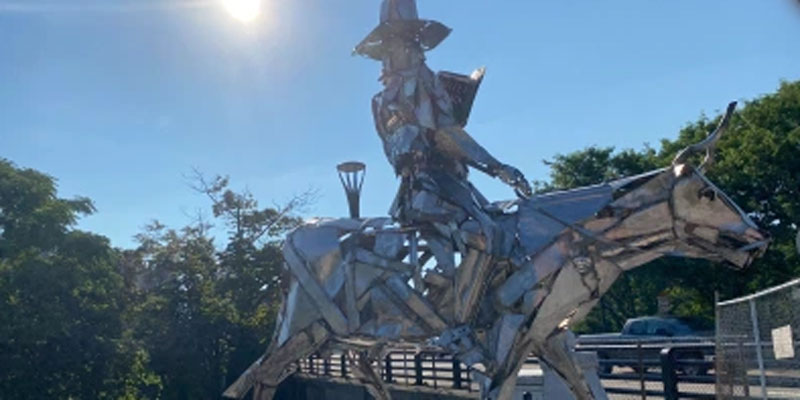
The controversy over a William Blackstone statue on private property is a sign of a civilization that cannot last.
Whether there should there be a statue depicting Reverend Blackstone in Pawtucket is a question for the people making the investment of time and money and, to a lesser extent, the people in the area. What should concern us all, however, is the way in which these public debates are being conducted.
Let’s take a look at the most glaring thread in Eli Sherman’s WPRI article on the controversy. Sherman flashes the nature of the outrage first and then provides the statue opponents’ explanation of the history, but the story’s clearer if we reverse that. So, here are paragraphs 10 and 12 (emphasis added):
William Blackstone’s story isn’t as well-documented as that of Roger Williams, according to local historian Richard Kazarian. But his arrival in Rhode Island is tied to the beginning of widespread death among Narragansett people. …
“The reality is that over the course of Blackstone’s lifetime, the native populations that resided in Rhode Island for millennia, were violently eliminated,” Kazarian wrote in an essay he penned at the request of Billington and others.
Based only on these details (and I assume Kazarian would have been more explicit about Blackstone’s misdeeds if he could have been), it may be that Blackstone regularly attempted to restrain his fellow settlers from doing damage to the indigenous people. We can’t tell, but it doesn’t seem to matter. Statues to any colonial figures are clearly a problem. Now turn back to paragraph 7 for the opponents substantive argument:
“Should I put up a statue of Hitler?” said Bella Noka, a Narragansett tribe elder. “I would never do that because it’s insulting to many people and I have respect for the Jewish people who went through such pain. That didn’t even happen on American soil, yet there’s more respect for them and their struggles than there is for indigenous people.”
In other words, any colonial figure with a familiar name is tantamount to Hitler in Noka’s mind.
The logic of identity politics and social justice leads directly to the fad among elites of beginning meetings “land acknowledgments,” which assert that “non-Indigenous Peoples” are “visitors.” And if we’re mere visitors, then obviously we have no right to erect statues of our forefathers. The only solution is to elevate the representatives of “Indigenous Peoples” to status as the rightful landholders, pay them tribute, and ask their permission for anything we want to do… or leave and begin a sort of diaspora of Americans of European descent.
The fact is that humanity is where it is. It is entirely appropriate for us to acknowledge the wrongdoings of centuries long gone with an eye toward improving things moving forward, but we cannot become fixated on the past — certainly not in a simplistic way that washes away all context and distinctions. A civilization that does that will not last, and I fear we’re seeing more and more evidence that this is so.


[…] (Original story; and Justin’s take). […]
Is it really necessary to say that conquest is probably the oldest form of land acquisition, well preceding purchase; and was certainly practiced by the native Americans.
[…] settlement of this country by people of European descent. An article from August about the statue made that clear. Every familiar colonialist name is indistinguishable from Hitler to these activists, no matter […]
[…] settlement of this country by people of European descent. An article from August about the statue made that clear. Every familiar colonialist name is indistinguishable from Hitler to these activists, no matter […]
[…] Just one caveat: could we please make them aesthetically pleasing rather than conspicuously artsy? […]